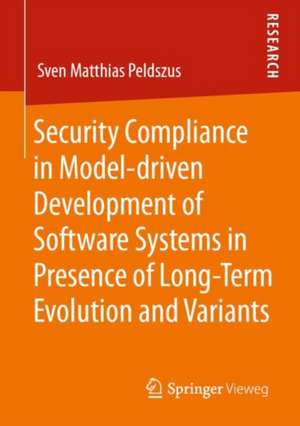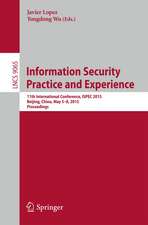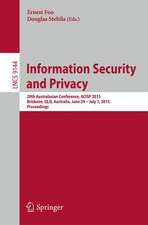Security Compliance in Model-driven Development of Software Systems in Presence of Long-Term Evolution and Variants
Autor Sven Matthias Peldszusen Limba Engleză Paperback – 14 iul 2022
Preț: 595.48 lei
Preț vechi: 744.35 lei
-20% Nou
Puncte Express: 893
Preț estimativ în valută:
113.96€ • 118.67$ • 96.31£
113.96€ • 118.67$ • 96.31£
Carte tipărită la comandă
Livrare economică 07-21 martie
Preluare comenzi: 021 569.72.76
Specificații
ISBN-13: 9783658376642
ISBN-10: 3658376643
Pagini: 476
Ilustrații: XXXVI, 476 p. 138 illus., 80 illus. in color.
Dimensiuni: 148 x 210 mm
Greutate: 0.61 kg
Ediția:1st ed. 2022
Editura: Springer Fachmedien Wiesbaden
Colecția Springer Vieweg
Locul publicării:Wiesbaden, Germany
ISBN-10: 3658376643
Pagini: 476
Ilustrații: XXXVI, 476 p. 138 illus., 80 illus. in color.
Dimensiuni: 148 x 210 mm
Greutate: 0.61 kg
Ediția:1st ed. 2022
Editura: Springer Fachmedien Wiesbaden
Colecția Springer Vieweg
Locul publicării:Wiesbaden, Germany
Cuprins
Introduction.- Running Example: iTrust.- State of the Art in Secure Software Systems Development.- A Walkthrough of the Proposed Development Approach.- Program Model for Object-oriented Languages.- Model-Synchronization and Tracing.- Application to Legacy Projects using Reverse-Engineering.- Static Security Compliance Checks.- Verification and Enforcement of Security at Run-time.- Specification of Variability throughout Variant-rich Software Systems.- Security in UML Product Lines.- Security Compliance and Restructuring in Variant-rich Software Systems.- The GRaViTY Framework.- Case Studies.- Related Work.- Conclusion.
Notă biografică
Since 2016, Sven Matthias Peldszus has been working as a research associate at the University of Koblenz-Landau and joined the Ruhr University Bochum after defending this thesis. His research interests include continuous tracing of non-functional requirements over the entire software life cycle and software quality analysis in variant-rich software systems.
Textul de pe ultima copertă
For ensuring a software system's security, it is vital to keep up with changing security precautions, attacks, and mitigations. Although model-based development enables addressing security already at design-time, design models are often inconsistent with the implementation or among themselves. An additional burden are variants of software systems. To ensure security in this context, we present an approach based on continuous automated change propagation, allowing security experts to specify security requirements on the most suitable system representation. We automatically check all system representations against these requirements and provide security-preserving refactorings for preserving security compliance. For both, we show the application to variant-rich software systems. To support legacy systems, we allow to reverse-engineer variability-aware UML models and semi-automatically map existing design models to the implementation. Besides evaluations of the individual contributions, we demonstrate the approach in two open-source case studies, the iTrust electronics health records system and the Eclipse Secure Storage.
About the author
Since 2016, Sven Matthias Peldszus has been working as a research associate at the University of Koblenz-Landau and joined the Ruhr University Bochum after defending this thesis. His research interests include continuous tracing of non-functional requirements over the entire software life cycle and software quality analysis in variant-rich software systems.
Since 2016, Sven Matthias Peldszus has been working as a research associate at the University of Koblenz-Landau and joined the Ruhr University Bochum after defending this thesis. His research interests include continuous tracing of non-functional requirements over the entire software life cycle and software quality analysis in variant-rich software systems.


























